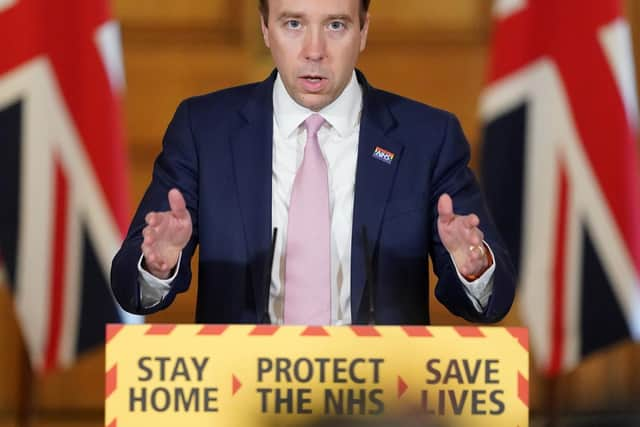Government launches pilot of test, track and trace app - What we learned from the latest Downing Street coronavirus briefing
and live on Freeview channel 276
Mr Hancock confirmed that the app would be trialled in the Isle of Wight during the latest Downing Street Covid-19 briefing.
He was joined at the briefing by the deputy chief medical officer for England, Professor Jonathan Van-Tam and Professor John Newton, national coordinator of the UK coronavirus (COVID-19) testing programme.
Advertisement
Hide AdAdvertisement
Hide AdThe Government will begin to pilot the test, track and trace app on the Isle of Wight, from Tuesday, May 5, which will tell people if they have been in recent contact with someone who has tested positive for coronavirus.


Here is what we learned about the app and other developments on coronavirus.
The test, track and trace app will be piloted in the Isle of Wight
The pilot of the app on the Isle of Wight will begin on Tuesday involving an "army" of human contact tracers.
Advertisement
Hide AdAdvertisement
Hide AdOn Tuesday NHS staff on the island will be able to download the app and on Thursday each one of the 80,000 households on the island will get a letter from the chief nurse with comprehensive information about the trial.
Islanders will then be able to install the app.
Setting out the new test, track and trace programme Health Secretary Matt Hancock said it would "hunt down and isolate the virus so it is unable to reproduce".
"Crucially, test, track and trace allows us to take a more targeted approach to lockdown while still safely containing the disease," he said.
"Creating this system is a huge national undertaking of unprecedented scale and complexity."
Advertisement
Hide AdAdvertisement
Hide AdMr Hancock appealed to those on the Isle of Wight to download the app to help save lives but stressed that the trial does not mean the end of social distancing.
Test, track and trace aims to make sure the number of cases continues to decline
Matt Hancock said the test, track and trace programme was aimed at making sure the number of cases continued to decline and the infection rate of coronavirus remained below one.
"Test, track and trace becomes more effective the lower the number and then we want to keep the number going down by keeping the R below one, the rate of infection," he said.
Advertisement
Hide AdAdvertisement
Hide Ad"Our goal is not simply to flatten the curve, it is to get the occurrence of Covid-19 infections to very low levels."
More than 18,000 contact tracers could be required for the test, track and trace programme
The Health Secretary said more than 18,000 contact tracers could be required for the test, track and trace programme.
Matt Hancock said: "There is no magic around the 18,000 figure, that is the initial scale that we think is necessary.
Advertisement
Hide AdAdvertisement
Hide Ad"If it needs to be bigger, when we find out from the ONS survey that is in the field at the moment what the prevalence of the disease is - the number of new cases per day actually out there rather than that we find through positive tests - then we will adjust that figure.
"That is the initial goal but it will be up and running by the middle of the month."
Easing of lockdown is not dependant on contact tracing
The Health Secretary has said the easing of the lockdown measures was not dependent on contact tracing being rolled out across the country.
Mr Hancock said: "We haven't said we can't make changes before it is up and running.
Advertisement
Hide AdAdvertisement
Hide Ad“It is just that the test, track and trace system will help us get R down and the lower the number of new cases, the more effective it will be.”
Asked if the app pilot would see the lockdown restrictions eased sooner in the Isle of Wight, Mr Hancock said: "I can reassure you that there aren't any changes to social distancing measures that are proposed as part of this pilot.
"The pilot is to find out how the app works."
Coronavirus case numbers need to be lower
The deputy chief medical officer for England, Professor Jonathan Van-Tam, has said the risk of a second wave of Covid-19 was being kept under close review.
Speaking at the daily No 10 press conference he said there had been a "steady decline" in the numbers of hospital patients with coronavirus and a "slow and consistent decline" in the numbers of deaths.
Advertisement
Hide AdAdvertisement
Hide AdHowever he said that the numbers of new cases of people testing positive for the disease needed to come down further.
"We have to get the cases lower," he said.
The Health Secretary is taking part in a coronavirus antibody trial
Health Secretary Matt Hancock, who has recovered from coronavirus, announced he is taking part in a trial to analyse patients' antibodies.
He said: "I very much hope that the science shows that the people with antibodies, who have tested positive for having antibodies, have a low risk of transmitting the disease and a low risk of catching it - both are important, low risk of catching it to protect me, low risk of transmitting it to protect others."